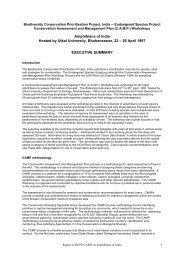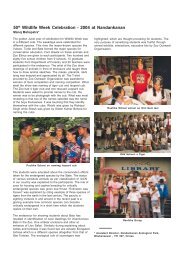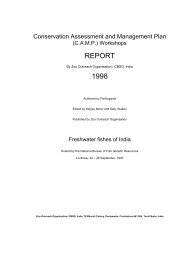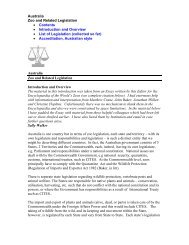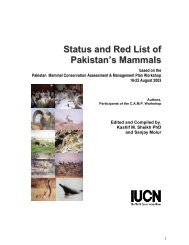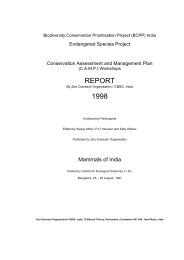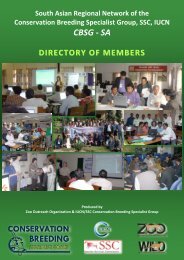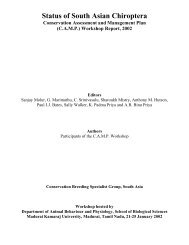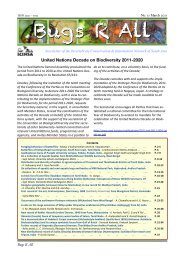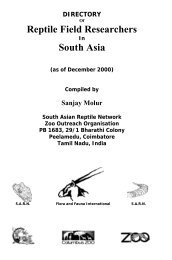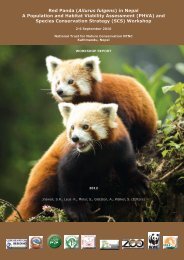IPNSA - Zoo Outreach Organisation
IPNSA - Zoo Outreach Organisation
IPNSA - Zoo Outreach Organisation
Create successful ePaper yourself
Turn your PDF publications into a flip-book with our unique Google optimized e-Paper software.
PREAMBLEThere are many impending environmental crises that face the human race today. Climatechange and global warming are among the best known and have become household termsbecause their effects are experienced by citizens of all nations, rich or poor, from temperateto tropical regions.A crisis that is less well known, even though it has enormous consequences for foodproduction and nutritional security of nations, is the decline of domesticated and wildpollinators. This decline is largely due to intensification of agriculture worldwide which has ledto destruction of nesting habitats for wild pollinators, poisoning due to extensive pesticideapplication for larger crop yields, and alteration of cropping patterns and land use practicesleading to loss of adult and juvenile food resources for pollinators.Like global warming, the pesticide crisis has also become a household word, especially whenthe horrific impacts of endosulfan on farm workers and their children in Kerala were revealed.Earlier, the usage of DDT and its appearance even in breast milk have surely entered nationalconsciousness. The links between pesticides and human health appear to be firmlyestablished in the public mind. Organic food is now very much in the attention of the mediaand hence of the public. However, the links between pesticides and pollinator health have notbeen realized.Furthermore, the impact of land use practices on pollinator biology and reproduction iscompletely ignored. This is not the public’s fault. Even most biologists do not appreciate thisproblem, and even those that do, often assume that the crop scientists must be taking careof it.Most statistics on food production also tell us how many metric tons of “food” are produced,but “food” production in terms of calories alone are meaningless statistics because a nationand a world needs nutritional security in terms of micro- and macro-nutrients and not justcaloric security. The backlash against fast-food is a sign of the times. Micro-nutrient diversity,especially in a largely vegetarian population as exists in many parts of Asia, requires cropdiversity, not just rice and wheat. Crop diversity is directly linked with pollinator diversity. Inrecognition of the importance of pollinator services for food and nutritional security, the Foodand Agriculture Organization (FAO) have made the pollinator issue of prime importance.A recent review of the importance of pollinators for world crops (Klein 2007) cited very fewstudies from Asia. Does this mean that there are no good studies on the impact of pollinatorsfrom Asia or does this mean that these studies are buried in reports or other inaccessibleplaces and need to be brought into the public eye? We, in Asia, need to examine the evidenceand the ameliorating measures for pollination security as fast as possible. Klein concludedthat except for a few crops, published information of crop pollination is scarce.We, in <strong>IPNSA</strong> therefore believe that our prime tasks should be the following:1. To form a network of resource managers, stakeholders, and personnel who can provideinformation on pollination and pollinators.2. To collate and analyze published and unpublished information as well as traditionalwisdom/unconventional sources of such information, in order to evaluate the magnitudeand consequences of disruption of pollinator services.3. To use this analysis of secondary data on pollinators and pollination services and thepollinator network to engage in discourse with policy makers and civil society in order toeffect a positive impact on pollinator conservation.4. To develop methods and impart training for rapid assessment of pollinators and impactsof their declining status.5. To create awareness at all levels.- Editors



